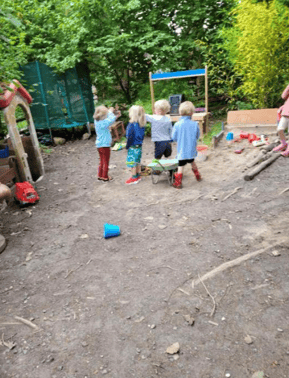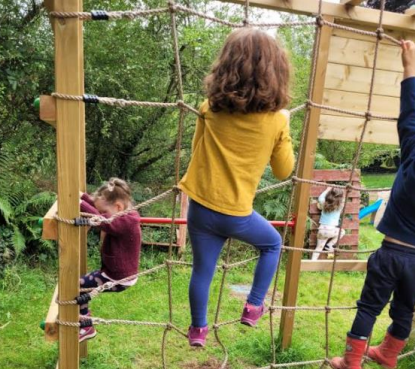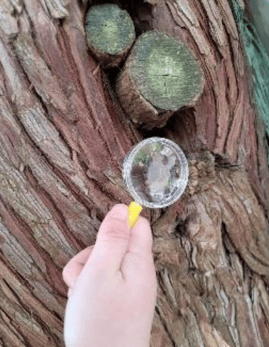Today as I begin my second year of my Masters in Early Childhood Studies I took time to
reflect.
Over the span of 12 months my academic and professional growth through this learning journey has far exceeded my expectations. Through the completion of three modules, I have increased my knowledge of early years frameworks, concepts and the language of early years.

Professionally I have co-hosted a webinar Risk In Outdoor Learning and Play (Gill,2021), attended webinars with leading experts Nurturing Pedagogy ( Hayes, 2021) EY Literacy (French, 2022), Parent collaboration (O’Kane, 2022), STEAM in EY (Magennis, 2021) and contributed to many research thesis and participated on student panels.
I have deepened my understanding of contemporary issues in early childhood, discovered my social responsibility in advocating for equality and inclusion and identified many diverse childhood approaches in my own emergent curriculum.
Early years practitioners actively implement Aistear, Siolta, the First 5, Aim and Better Start programs into practice. We are change-makers. We are active outdoors, play, social equality and children’s rights advocates.
We are found playing with lego, sitting down outside, reading a book, dancing to a song, playing a drum, digging with the kids, playing hide and seek, kicking a ball, sitting on a swing,
planting bulbs or picking peas.
We draw with the kids, we observe, we learn. We are fully emersed in play as an active process regardless of the end product (Bruce, 2001). Belonging to the community of learners on this Masters journey has fulfilled my sense of wellbeing and value. It has given me both the language and confidence to start and join other communities to increase our collective knowledge and drive change.

The changing support needed for the childhood of today can sometimes feel unsurmountable. The importance for children to feel a sense of belonging and positive health and wellbeing is an important aspect of our work, more so due to the pandemic.
We must recognise cognitive and emotional development are interwoven for children (Zigler, 2007). Mindfulness, recognising and supporting children’s emotions is important for all children, and this is not surprising!
Not only have we as a society lived through the greatest pandemic of our time, but our children’s childhood has also been fundamentally affected and we need to support them
in navigating this new ‘today’.
With this in mind, the flexibility of an emergent curriculum is more important than ever.
Effective balancing of our multiple roles of advocate, scaffolder, carer, listener, role model, a friend can only be managed through more reflection and more observation is critical now.

Through reflection and observation, we can identify triggers, see who needs help to access play, help restore energy, promote self-regulation.
Free play is the active process of an emergent curriculum. Free play allows children to build their own expertise, make decisions, seek help, find out their own boundaries, take risks (Gill, 2007).
Outdoor environments provide unrestricted access to play while continually learning about STEAM (Magennis, 2022). We are naming and visually labelling processes, maths concepts, science techniques, equipping these children with the language of STEAM. You will find them looking for magnifying glasses, measuring, constructing water and pebble runs, running mud
bakeries.
As practitioners, we are at the forefront of the child’s voice. We are actively emersed in the play of children and witness their emerging interests daily (NCCA, 2006). 2021 also introduced me to the area of the language of research methodology. This clarified for me the critical importance of a new developing role of practitioners that of the research practitioner.
With our interaction with children, families, support services we are experienced already in interviewing, preparing and documenting case studies (Aim profiles, lesson plans, individual learning plans), walking the area, soliciting feedback from peers, children and their families.
Talking to children about their drawings is a technique Draw and Discuss. Gathering
Artefacts – photos, videos, audio clips, drawings. Talking to children about their
feelings – Name it to Tame it. Taking about melts downs – Connect and Redirect. It
also helped me to actively virtually connect with parents on gathering information.
So professionally my research skills and terminology have developed and widened providing me with the opportunity to influence change on a larger scale.

I can advocate not only on behalf of the children involved in this evidence gathering but
also on behalf of practitioners and our changing sociology of childhood.
Further benefits came from taking this new knowledge and applying it to my own practice
and interactions with families.
Applying my learnings to process and policy development in our emergent curriculum setting has resulted in transformational change. We now have a preschool transition process that includes a family mapping stage at home with the child where the parents and children are involved in visually capturing the child’s interests and mapping a day in their life.
Photos, videos, audio clips and drawings are all incorporated with the process before the child’s first day. Families are fully immersed in our culture and emergent curriculum before even stepping foot on site.
We are building a culture based on the child’s interests, parental involvement and connectivity. All of this contributes to meaningful experiences for the child.
Once shared with us we use these artefacts to create a personalised journey map in a day of preschool for the child. In a service where natural holistic development is promoted I finally feel we have a transitions process that also acts as an introduction to our early years community or practice.
Moving into my second year I am excited about my future professional and academic
opportunities and effecting change on a sectoral level.
“To take children seriously is to value them for who they are right now” - Alfie Kohn, 2021
Works Cited
Bruce, 2001. Lerning through play : Babies, Toddlers and the Foundation Years. 1st ed. s.l.:Hodder &
Stoughton.
Gill, T., 2007. No fear. Growing up in a risk averse society. 1 ed. London: Calouste Gulbenkian
Foundation.
Magennis, M., 2022. OUTDOORS In the Early years : Underpinning STEAM Concepts the Natural Way.
1st ed. Dublin : Portobello Institute.
NCCA, 2006. Developing an Emergent and Inquiry based curriculum, Dublin: NCCA Aistear Siolta
Practice Guide.
Zigler, E., 2007. Giving intervention a head start : A conversation with Edward Zigler. Educational
leadership , 65(1), pp. 8-14.
About the Author
Denise Sheridan works full time as an Early Years practitioner specialising in creating learning environments where the child’s interests are paramount. She runs Ulla Beag in East Clare and is currently completing a Masters in Early Childhood Studies through Portobello Institute and the University of East London. Watch Denise's presentation with Tim Gill at our early years webinar below.
MA Early Childhood Studies
If you are interested in learning more about our MA Early Childhood Studies you can visit the course page here. If you would like more information on this you can contact our admissions advisor Jennifer Matteazzi on 01 892 0031 email jennifer.matteazzi@portobelloinstitute.com or book a consultation call at a time that suits you here.




.png?width=352&name=Feature%20image%20(75).png)
.png?width=352&name=Portobello%20blog%20-%20%20featured%20image%20(3).png)